A. filled our tubs Wednesday night. I’d mentioned that a rainstorm was due around the end of the week and she’d checked with Landis (Landis is more grounded than I am) and he’d confirmed with his cousin, who works for the city, that it was tub-filling time. She assembled a go-bag, too. And we’re not preppers. We balance each other out. On Thursday the Alexes, across the street, texted the LVV group: How’s everyone feeling? I responded: I’m underworried. A. is overworried.
Thursday’d been strange. We’d already gotten over four inches of rain on Wednesday alone, and Ray’s Weather (Asheville) had adopted a rare, strident tone, employing words like “catastrophic” and “disastrous” in their forecast. People were awakening to the notion that something big was brewing. Our new East Asheville cafe, BattleCat Beverly Hills, had flooded in July during a brief downpour. The landlords had previously spent $20,000 on water remediation and still it got in. At 9 a.m. Thursday the manager texted to tell me she couldn’t mop up and stem the flood waters fast enough. It was coming in on a different side now from the vacant space next door, seeping in under the built-in bench seating. I told her to shut it down. At Daymoon, in Fairview, we took the unusual step of closing early because my afternoon barista wasn’t feeling good about driving in and back from West Asheville.
But the rain calmed and the afternoon passed anti-climactically. The emergency withdrew slightly into a gray ambient wetness, a sense of pending, of suspension. I regretted closing early.
Then A. and I drove to Shingles (Shiloh Ingles) around five and merged with a fellow population of panic-shoppers. We were low on the freak-out scale, a 3, maybe 4 out of 10, electing a small cart. Already the water stores were heavily depleted, with only jugs of “baby water” left on the shelves. The impending crisis had not punctured our levity. “They make water just for babies?” we stood there marveling. “Special baby water?” What did we know, so obviously childless, with our modest cart and restful nights?
The lines were long. I bought an umbrella. A. said a woman who came in while we were queued up frowned and shook her head at the scene. I’d been that woman before: Sensitive American sheep, so easily goaded into consumerist binging.
The rain as we decamped from Shingles was biblical. A. (who’d been able to find her raincoat) backed the Prius under the building’s eave while I loaded the trunk. In that critical, slapstick interval between umbrella-collapsing and door-closing I became drenched. We took the back way home, cutting through the neighborhood of some friends whose cat we were supposed to start tending the next day. (They’d hopped a flight out to Chicago that morning.) It was white-knuckle, hazards-on driving, a proper squall that relaxed significantly over the short drive home.
Do we need to have a hurricane beer to calm the nerves? texted Shelix at 7:20 p.m.
Yes plz! I said.
We’ll be right over, said Meagan.
The LVV, which stands for “Lower Valley View” and is shorthand for our fictitious HOA, is 18, 20 and 24 Valley View Road. That is: the Alex and Alex Mitchells, the Tim and Meagan Scroggses, and the Arielle and Devin Walshes (of Tallboy). Everyone braved our soggy yard and huddled on the front porch.
Leo Scroggs, who’d quite surprised his parents on announcing his presence three years prior, doddled about on his own business, a beautiful, mischievous creature with his mother’s curly hair in his father’s blond, beaming at A. and hissing at her. (She beamed and hissed back.) Leila, the middle Scroggs, a sun-bronzed pin drop of an 11-year-old, sat within her customary reserve while her brother Ezra, who was getting his Learner’s Permit, interacted freely with the growns.
We discussed 2004, when Frances washed up to Appalachia and flooded lots of Asheville—a disaster we’d all been present for, which is itself a rarity in our town. Asheville’s grown so quickly that odds are high any group consisting of three or more interior groups will include someone who just arrived—or at any rate fewer than 20 years ago. In fact A. and I are the newcomers in our set, and we’d moved to town (separately, following discrete paths) in ‘03. UNCA closed the dorms after Frances over the water issues—which had affected the Alexes. A.’d been living in a place just off campus with roomies that had all lit out together on an impromptu road trip to D.C. I lived alone at the time, 24 and establishing residency for in-state tuition, taking a couple classes at AB-Tech, working at coffee shops, renting a spacious basement apartment in hilly Kenilworth for $400 a month. Awoke that morning in a powerless house, drove down the way knowing no better but to assume class was still on, thought I’d stop off at the convenience store on Biltmore Road for a cup of coffee, took a left and headed downslope and came gradually to realize that the intersection before me at the bottom of the hill had been swallowed by an enormous, raging river.
The convenience store was closed, too.
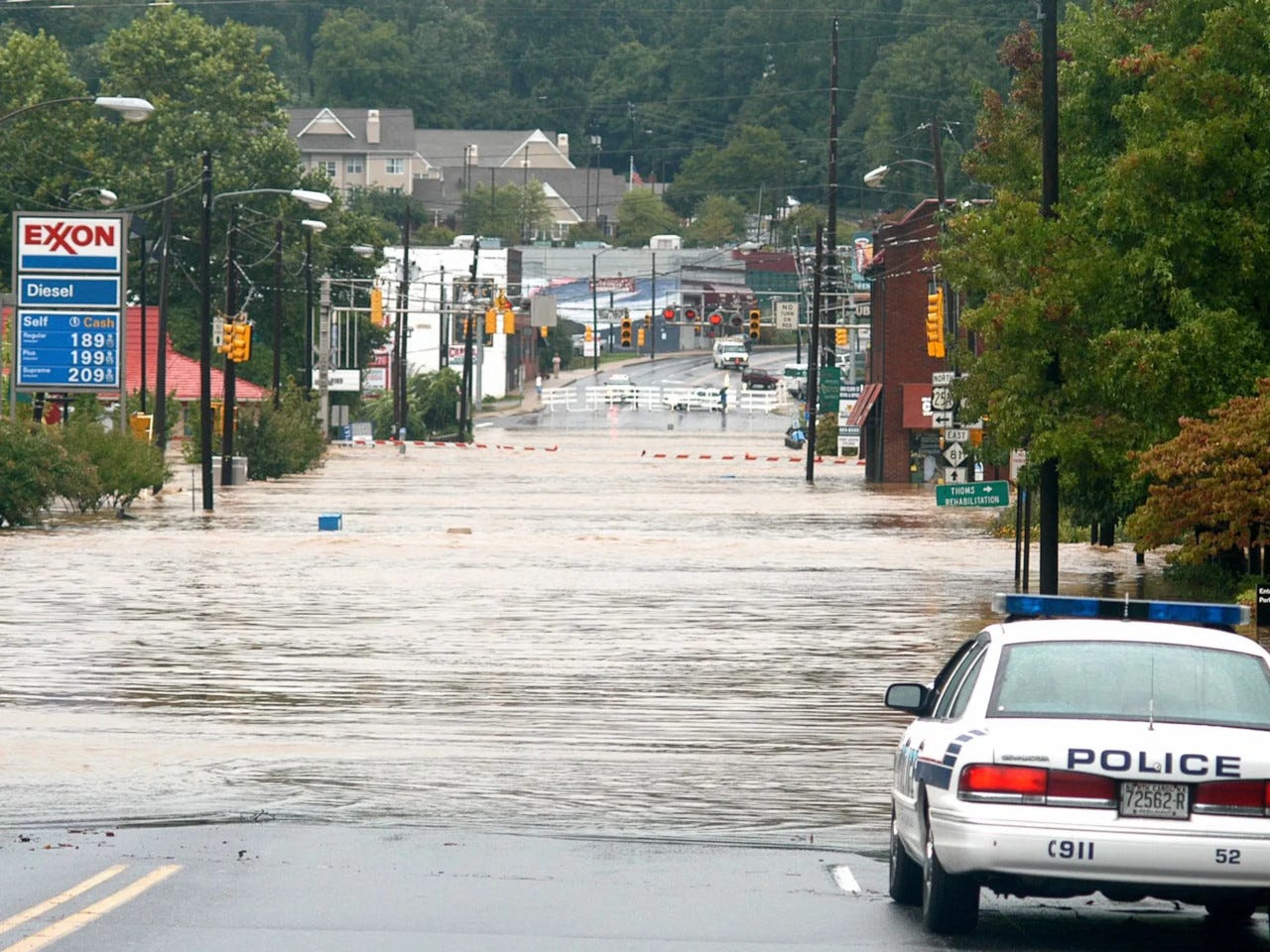
Later we’d all see The Weather Channel’s footage of houses etc. floating down that river. My memory is that the power returned fairly quickly but Ivan hit a few days later, made everything worse, and the boil water advisory lasted days. Finally they said you could shower in it, just keep your eyes and mouth shut. So that was ‘04.
The attitude on the porch was pretty blasé in spite of Ray’s Weather’s apocalyptic tone and Landis’s cousin at the city. We’ll deal with whatever happens. Let’s just get it over with. The Alexes’ basement had flooded once before already and they’d ripped out the carpet. If it flooded again they’d deal with it. The Scroggs’s basement’s water problems were behind it—or at least as much as an octogenarian house’s could be. We were tall on our little sloping .17 acres, sixteen steps up to the front porch, mostly just relieved that we’d finally gotten around to paying some arborists for a full day’s trimming of the willow in our front yard, whom we called Willow and who loomed in an eldritch manner over all the LVV, a craggy and imperious hermaphroditic witch monarch whose moods shaded the neighborhood, the tallest or second tallest willow in the city according to one arborist, excepting maybe a specimen he remembered in Montford.
Years Willow’d dined on regular backlogs of rainwater pooling near the nadir of our neighborhood owing to a situation with a drain pipe. But the Scroggses had seen to the situation recently (owing to the need to sell their house, owing again to Leo) and now when it rained, rather than filling up a grassy bowl Willow slaked themself on, it sluiced in an orderly fashion down the road and out a pipe to the drainage ditch. Willow’s starvation seemed palpable to me. Notoriously immoderate growers, willows. Now large and potentially car-crushing pieces were sloughing off all over. Even healthy-looking branches, fully in leaf, were revealed to be rotting on the inside. When you craned your neck to assess the very top canopy you saw a vast jagged tangle of bone dry limbs. Well, we’d handled it, just in time.
We cheersed our various cans and glasses: to Willow, to Frances, to the LVV!
We didn’t sleep that night but continuously awoke, chatty and nervous. The wind pressed on the wall at our heads with a deranged insistence. Rain pelted the windows like sand. Woke up again. Again. A sustained blast heightened and heightened, lasting longer than it should’ve, the storm blowing itself red in the face. At the instant you thought for sure it would subside or at least plateau—according to a rhythm it’d been hard at work training us to anticipate—it heightened again and our windows budged in their frames and we both gasped and finally it tailed. I couldn’t believe the ceiling fan was still going. Woke up again. Wind knocked over a glider on our back porch, pressed it against the window over my bedside table. Woke up again. Again with a jolt: a transformer exploded. This was a war noise, a resounding boom from extremely close by. The fan slowed, sped up again. There were some pines in not the best shape on the property line with our other neighbor. A. said: “Our game plan is, if you hear a cracking, roll out of bed and run, OK?” Woke up again. “The fan’s off,” I said. Checked my phone. 5:15. The wind. Woke up again into a silence and stillness and light that felt all at once deep and fragile and untrue. I went out to the living room and pulled back the curtains.
The willow was largely denuded, trim. You could see through it. Cut down to size but unvanquished. The yard was strewn with sylvan debris, potted with standing water, mud chopped up all over. We walked out like gnomes after the passing of the lawnmower.
It was after 10, late by our norms. I was gripped by the peculiarity of having at length slept through the first delicate hours of peace and revealed ruination. A. found the Alexes customarily unperturbed: Helix stoically dredged out the freshly flooded basement, Shelix reported back, “I think we’re fine!” A restive wind lashed about unpredictably. She remembered a sense of precarity. Unseen damage hanging overhead, tangled up in storm-jumbled canopies, liable to fall.
We boiled water for coffee on our gas stove and embarked driving in our pajamas on an area reconnaissance. The traffic lights were dead.
We live in Oakley, an unglamorous working-class East Asheville neighborhood jammed with houses and trees. In the fullness of time Helene would prove to have been a sort of Appalachian Tunguska Event, toppling incalculable tons of timber. In the coming days we’d encounter road after road choked with shattered trees and the chainsaw-wielding neighbors going at them in exhausted teams. So we didn’t realize at first how weird it was that we were able to drive all the way down to where Fairview Road disappeared under water. The winding two-lane road narrowed to one-lane here and there, accommodating cracked trees barging into traffic like comatose drunks still messy from last night’s party, festooned in power lines or leaning on them. The drivers were polite, cautious, patient. We parked at an apartment complex we’d once protested the construction of and walked down with the rest of the awestruck, as though on a pilgrimage to the water.
It was a proper river, lapping on our side the back door of a brewery we used to work for and, on the other, some couple hundred feet away, the front door of a brewery we weren’t crazy about. The railroad crossing posts flashed and sounded incessantly, up to their clanging mouths in swollen Sweeten Creek. A. took pictures. I sipped coffee, exclaimed, smiled foolishly. Disasters are always fun at first, I find, before they are unbearable. The imposition of the tremendous into the mundane. I’m thinking now of the Coors Light commercial from several years back—it’s one of A.’s favorite commercial moments—in which a magical ice-cold Coors Light train conducted by L.L. Cool J bursts out through the side of a snowy mountain, across a desert and into the parlor of a house. We inhabit a predictable world all in all, but every now and then an ice-cold beer train smashes onto the scene.
Our friends who’d left for Chicago the day before lived on the other side of the flood. “We’re not gonna get to feed Chomsky for a while,” I said.
We read books on the window seat in the snuggery upstairs. For an hour or two we’d had cell service, dispatched frantic texts to one another, nobody’s pictures transmitting, many of us unreachable. But the signals had all blinked out by early afternoon. We’d had water, too, for a second, and—I thought—a whole hot-water-heater-tank of the stuff, to boot. But then we lost pressure and the pipes went dry. Turn the spigot and hear a deathly metallic wheeze, then nothing.
No power, water, internet, phone. But property intact, neighbors to hand, sunlight glistening in the drooping wet leaves of the willow’s effusion just on the other side of the window seat’s windows. We were toe-deep in the water.




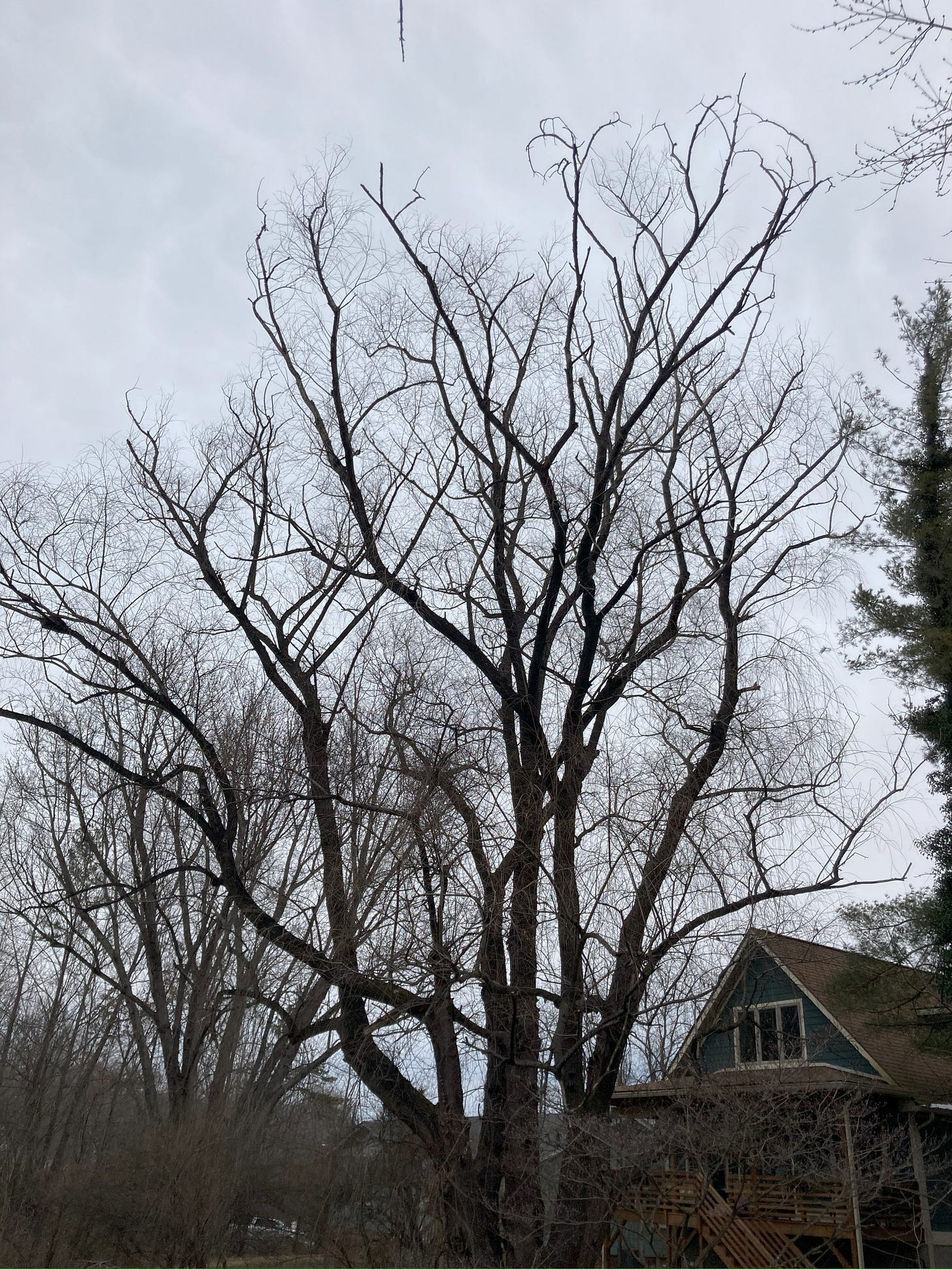
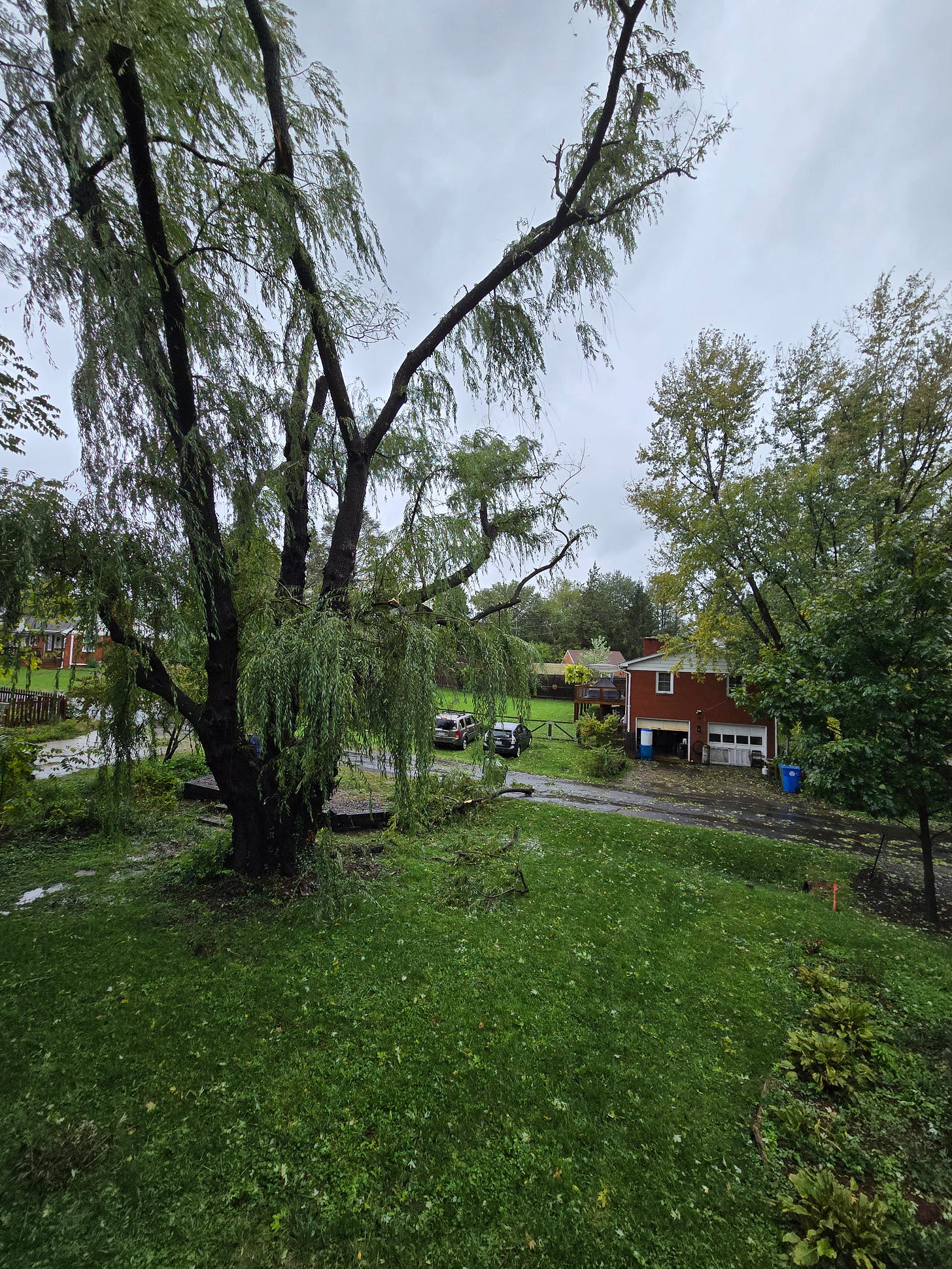
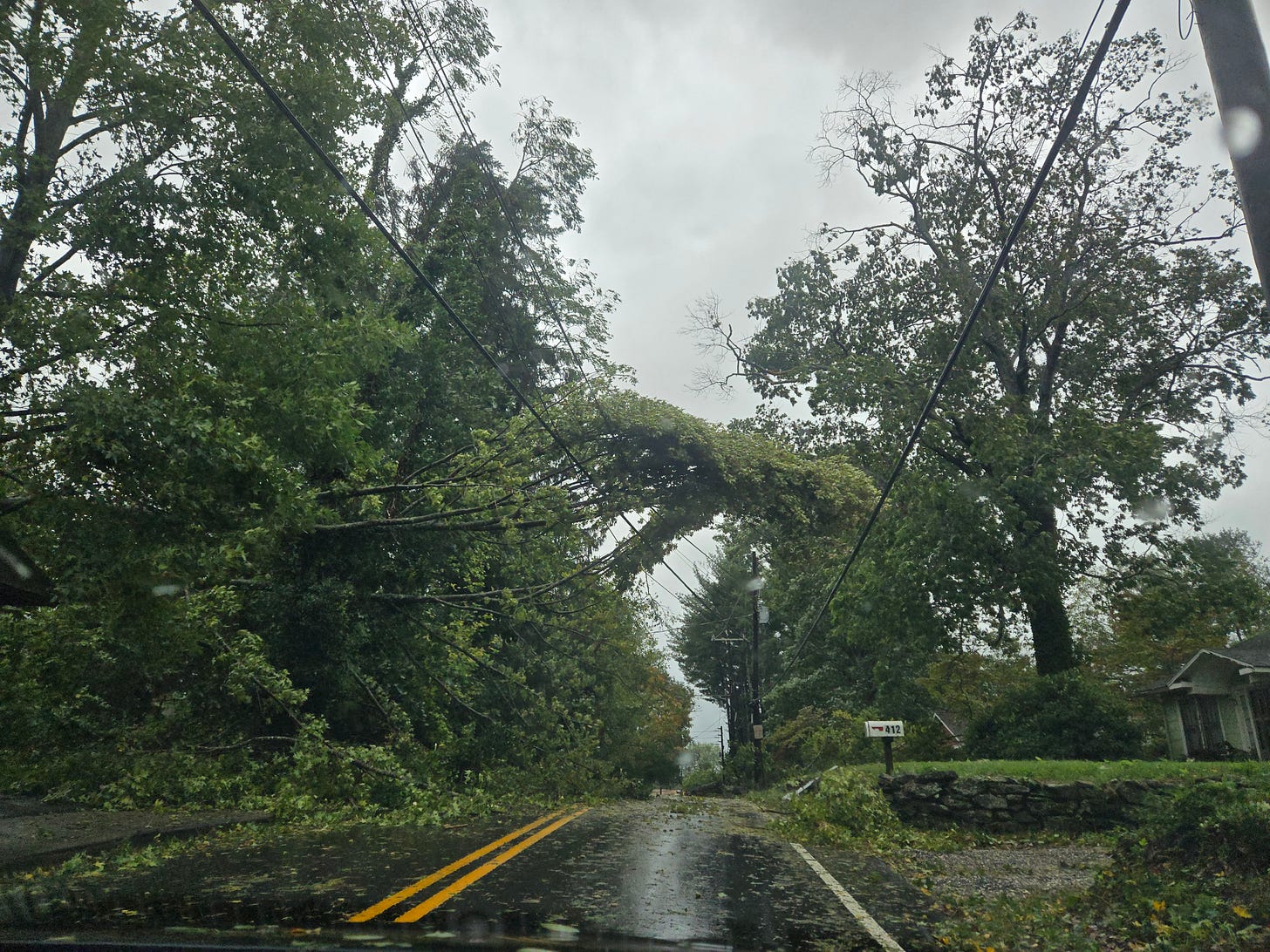
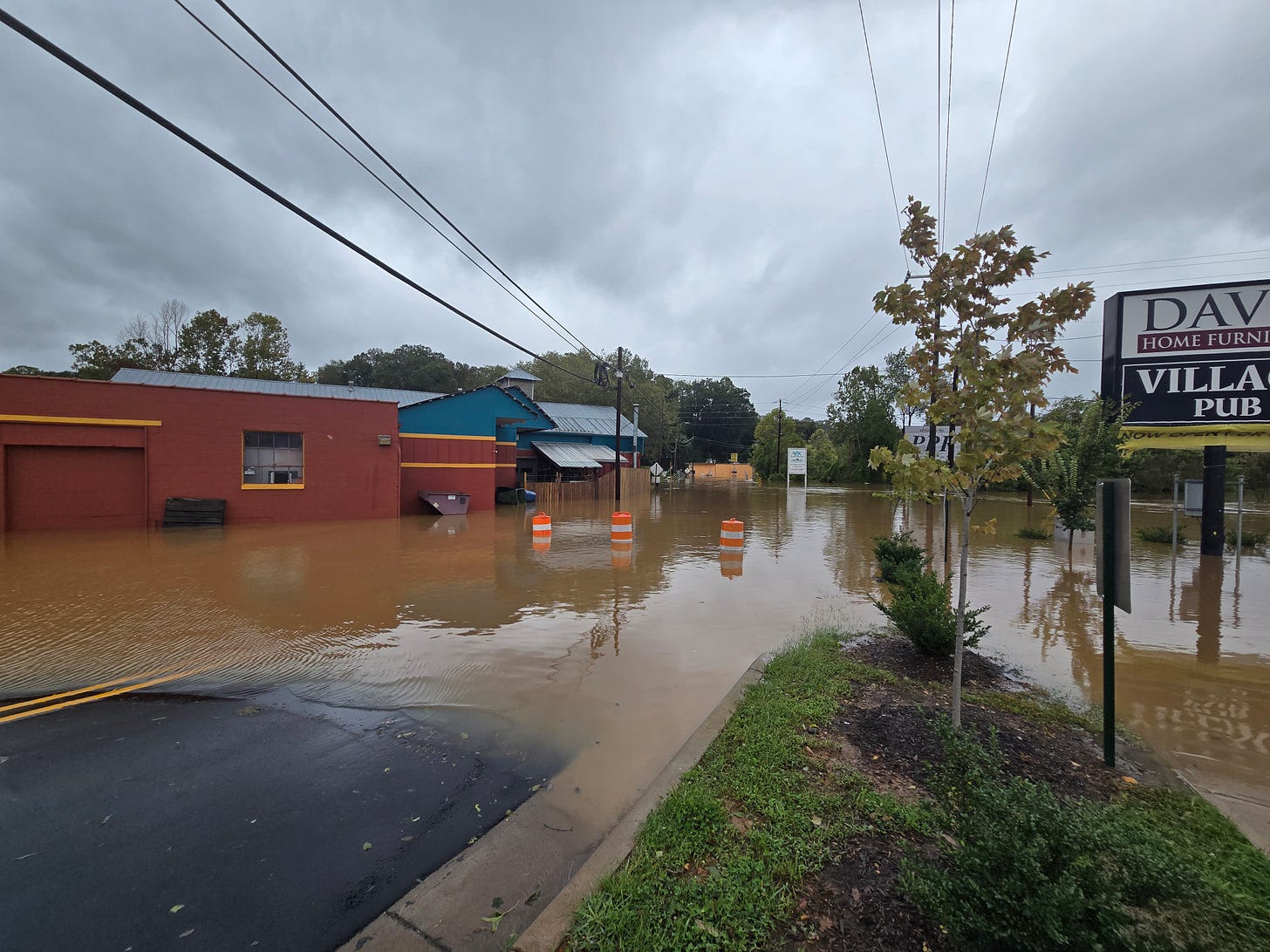
The suspense is killing me!
I love your personal description of the disaster, Devin.